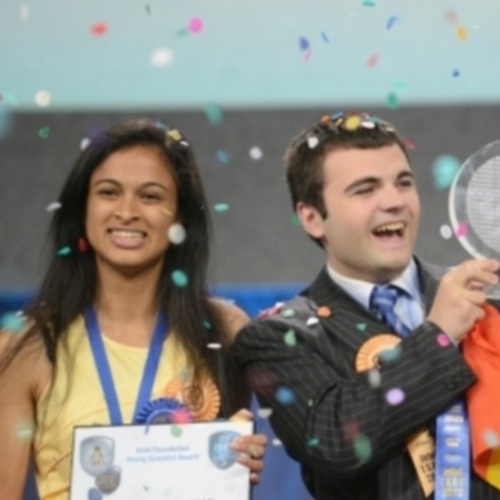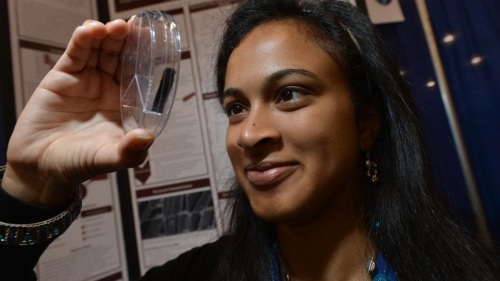Saratoga California high school student Eesha Khare used the frustration she felt from constantly finding her cell phone dead to design a supercapacitor that allows for recharging the device in just a few seconds.
The result of her efforts led to her being named a co-winner of this year’s Young Scientist Award, which was part of Intel’s International Science and Engineering Fair.

Eesha Khare upon being announced as co-winner of the Young Scientist Award. (Image via: pcmag.com)
Khare’s supercapacitor was designed to serve as a replacement for a small battery; specifically, those used in cell phones. It has proven capable of fully re-charging in about 20-30 seconds and can withstand several more charge / recharge cycles than today’s standard battery: 10,000 cycles instead of the 1,000 available in today’s models, to be exact.

Khare looking at the supercapacitor she created. (Image via: mashable.com)
The benchmarks achieved in this supercapacitor were made possible thanks to recent advancements in nanochemistry, Khare’s main area of scientific interest. For those unfamiliar with the technology, capacitors regulate the flow of electricity and can also be used to store electronic charges, as evidenced by Khare’s device.
The supercapacitor that Khare created was able to power an LED during demonstrations, but everyone that reviewed the technology agreed that its capabilities will rapidly expand as advancements in nano-technology are incorporated, going beyond cell phone batteries to even being able to one day replace electric vehicle batteries.
Worth noting — the supercapacitor is also flexible. As such, it can be used to power a bevy of other devices, including technologies embedded in clothing, or as part of roll-top electronic devices.
Khare plans on applying the $50,000 cash prize towards college, though with a credit like “Young Scientist Award” winner on her resume, a fully paid-for University scholarship is likely in her future. In terms of the technology, she plans on continuing her research into the supercapacitor, with the ultimate goal being to replace her personal cell phone’s battery with the technology.
Learn more about Khare in her profile video below:
Story via: intel.com
Advertisement
Learn more about Electronic Products MagazineIntel





